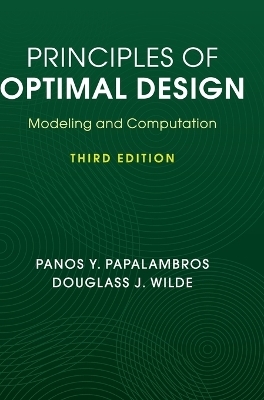
Principles of Optimal Design
Cambridge University Press (Verlag)
978-1-107-13267-2 (ISBN)
Design optimization is a standard concept in engineering design, and in other disciplines which utilize mathematical decision-making methods. This textbook focuses on the close relationship between a design problem's mathematical model and the solution-driven methods which optimize it. Along with extensive material on modeling problems, this book also features useful techniques for checking whether a model is suitable for computational treatment. Throughout, key concepts are discussed in the context of why and when a particular algorithm may be successful, and a large number of examples demonstrate the theory or method right after it is presented. This book also contains step-by-step instructions for executing a design optimization project - from building the problem statement to interpreting the computer results. All chapters contain exercises from which instructors can easily build quizzes, and a chapter on 'principles and practice' offers the reader tips and guidance based on the authors' vast research and instruction experience.
Panos Y. Papalambros is the J. B. Angell Distinguished University Professor and the Donald C. Graham Professor of Engineering, and holds additional professorships in Mechanical Engineering, Art and Design, and Architecture at the University of Michigan. His research and teaching interests are in design science and design optimization. He is the author of more than 350 research publications. He served as the Chief Editor of the ASME Journal of Mechanical Design (2008–2012) and is the founding Chief Editor of the Design Science journal. Douglass J. Wilde is Professor Emeritus of Mechanical Engineering at Stanford University, California. He conducted research in optimization, computational geometry, and control theory. On retirement he began exploring student team building in design contests. In addition to previous editions of Principles of Optimal Design, he has written two books, Teamology (2009) and Jung's Personality Theory Quantified (2011).
Preface; Notation; 1. Optimization models; 2. Model construction; 3. Model boundedness; 4. Interior optima; 5. Boundary optima; 6. Local computation; 7. Nongradient search; 8. Systems design; 9. Principles and practice; Notes; References; Author index; Subject index.
| Erscheinungsdatum | 04.05.2017 |
|---|---|
| Zusatzinfo | 25 Halftones, black and white; 50 Line drawings, black and white |
| Verlagsort | Cambridge |
| Sprache | englisch |
| Maße | 196 x 254 mm |
| Gewicht | 1300 g |
| Themenwelt | Technik ► Elektrotechnik / Energietechnik |
| ISBN-10 | 1-107-13267-3 / 1107132673 |
| ISBN-13 | 978-1-107-13267-2 / 9781107132672 |
| Zustand | Neuware |
| Haben Sie eine Frage zum Produkt? |
aus dem Bereich


